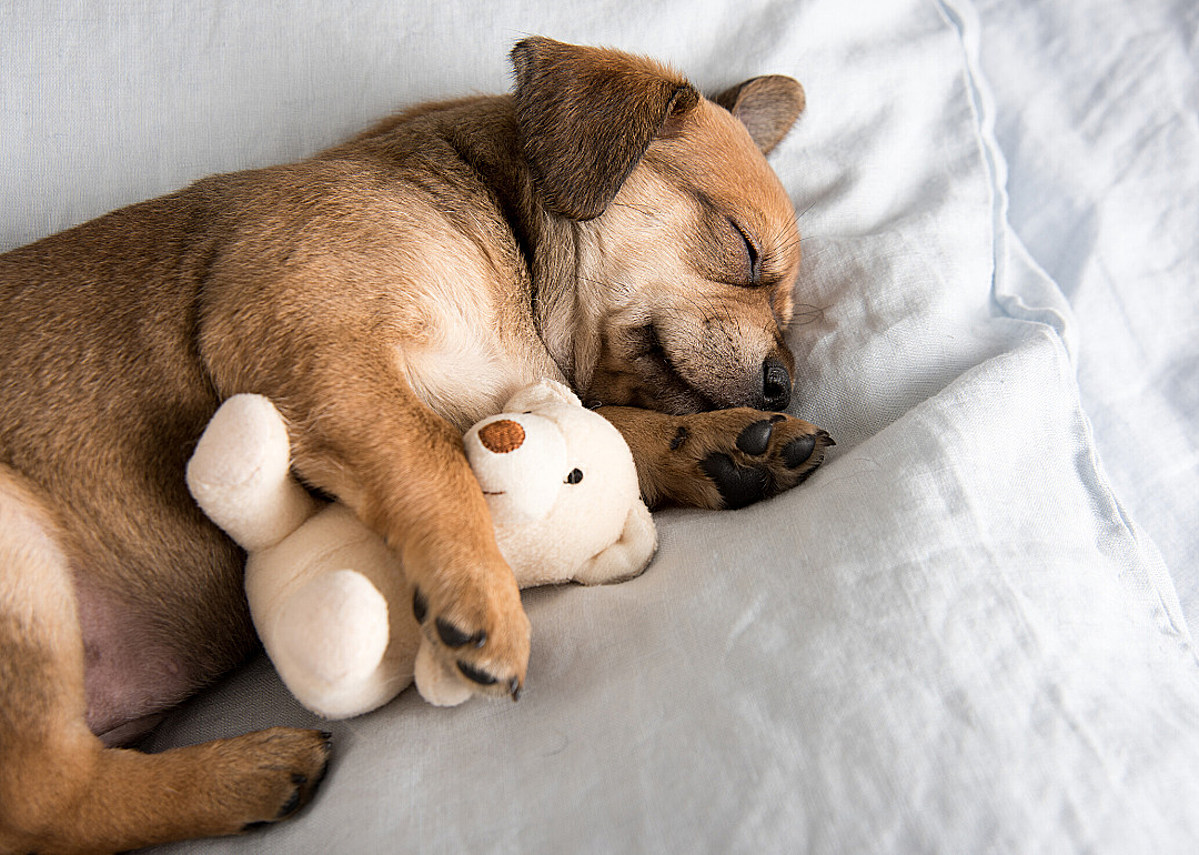
Puppies, with their boundless energy and playful antics, often leave us wondering, “Why do they sleep so much?” The answer lies in the fascinating world of puppy development and the unique requirements of their growing bodies. In this article, we’ll delve into the various aspects of puppy sleep, from normal patterns to potential issues and how to foster healthy sleep habits.
Normal Sleep Patterns in Puppies
Regular sleep patterns in puppies are essential for any dog owner. Puppies, much like human infants, require a significant amount of sleep to support their rapid growth and development. On average, a puppy can sleep anywhere from 12 to 18 hours a day, and this extensive rest is a crucial part of their overall well-being.
During their sleep, puppies undergo REM (Rapid Eye Movement) sleep, contributing significantly to their cognitive development. Recognizing and appreciating these normal sleep patterns allows pet owners to create an environment that fosters optimal growth and ensures their furry companions lead healthy and happy lives.
Developmental Reasons for Excessive Sleep

The prolonged periods of sleep in puppies may seem excessive, but they are rooted in crucial developmental reasons. During these extended slumbers, puppies undergo essential processes vital to their growth and well-being. One significant factor is the prevalence of REM (Rapid Eye Movement) sleep during these phases, contributing significantly to their cognitive development.
Just like human infants, puppies utilize sleep as a critical mechanism for learning, memory consolidation, and overall neurological advancement. These developmental reasons underscore the importance of allowing puppies the ample sleep they need, recognizing it as a fundamental aspect of their journey to becoming healthy and well-adjusted adult dogs.
Energy Expenditure and Nap Cycles
An intricate relationship between energy expenditure and nap cycles is pivotal for comprehending a puppy’s daily routine. Puppies, known for their bursts of energy, engage in play and exploration, expending considerable amounts of energy during their waking hours. These energetic bouts are inevitably followed by nap cycles, during which the puppy recharges both physically and mentally.
The correlation between these two elements is essential in crafting a well-balanced schedule that accommodates the puppy’s need for activity and rest. By recognizing the patterns of energy expenditure and nap cycles, pet owners can optimize their furry companions‘ daily lives, ensuring they receive the necessary stimulation and rejuvenation for overall well-being.
Sleep as a Stress Indicator
In the realm of canine well-being, the phrase “Sleep as a Stress Indicator” encapsulates the profound connection between a dog’s mental state and its sleep patterns. This concept underscores the significance of observing a dog’s sleep behaviors as a valuable diagnostic tool for identifying underlying stressors.
When a dog experiences stress, whether due to environmental changes, social factors, or health issues, it can manifest in disruptions to their normal sleep routine, restlessness, changes in sleep duration, or unusual behaviors during sleep can serve as subtle yet telling indicators of stress. By closely monitoring a dog’s sleep patterns, pet owners and caregivers gain insights into potential stressors, allowing for timely intervention and the creation of a more supportive and comfortable environment for their furry companions.
Common Puppy Sleep Disorders
“Common Puppy Sleep Disorders” explores the various sleep-related issues that may affect our furry companions during their early stages of life. This keyword delves into the potential challenges puppies may face in establishing regular sleep patterns. From restless nights to irregular sleep cycles, the description sheds light on these issues, guiding pet owners in recognizing signs of sleep disorders in their puppies.
The content provides valuable insights into when and why such disorders may occur, offering a comprehensive understanding of the factors that can disrupt a puppy’s rest. By addressing these concerns, pet owners can take proactive measures to ensure their puppies enjoy a peaceful and rejuvenating sleep, contributing to their overall well-being and development.
Establishing Healthy Sleep Habits
Creating a foundation for sound and restful sleep is crucial for the overall well-being of your puppy. “Establishing Healthy Sleep Habits” involves implementing a consistent and comforting routine that aligns with your puppy’s natural sleep patterns. This includes designating a comfortable sleeping space, maintaining a regular sleep schedule, and minimizing disruptions during their designated rest times.
By fostering a calming environment and providing a sense of security, you contribute to your puppy’s physical and mental development. These habits not only support their growth but also contribute to a harmonious coexistence between you and your furry friend. The key lies in understanding and catering to your puppy’s unique sleep needs, ensuring a happy and healthy life for your canine companion.
Nutrition’s Impact on Puppy Sleep
The influence of nutrition on a puppy’s sleep cannot be overstated. A well-balanced diet plays a pivotal role in determining the quality and duration of a puppy’s rest. Adequate nutrients contribute to overall health and vitality, impacting the energy levels during waking hours and the ability to settle into a restful sleep.
Choosing the right food and maintaining a consistent feeding schedule can significantly enhance a puppy’s sleep patterns, ensuring they receive the necessary nourishment for both physical and mental well-being.
The Importance of Mental Stimulation
Engaging a dog’s mind is crucial for their overall well-being, known as “The Importance of Mental Stimulation.” This concept emphasizes the significance of activities that challenge a dog’s intellect, preventing boredom and fostering a healthy mental state. Mental stimulation involves tasks like puzzle-solving, interactive games, and training exercises that keep a dog’s brain active.
By incorporating such activities into a dog’s routine, owners contribute to enhanced cognitive development, reduced anxiety, and a more contented and balanced pet. It’s a key element in ensuring the holistic health and happiness of our canine companions.
Handling Nighttime Disturbances
Nighttime disruptions are common, especially with younger puppies. Strike a balance between attending to their needs and encouraging independence during the night. Consistency is crucial in establishing nighttime routines.
Socialization and Sleep
Exploring the dynamic connection between socialization and sleep in puppies unveils the intricate balance needed for their overall well-being. Socialization, involving interactions with other pets and humans, significantly influences a puppy’s mental state.
Understanding how these social experiences impact sleep patterns is crucial for fostering a healthy environment. Striking the right balance between engaging play and sufficient rest is key, ensuring that a puppy not only enjoys social interactions but also experiences restorative sleep for optimal growth and development.
Common Myths About Puppy Sleep
Dispelling myths about puppy sleep can help pet owners better understand and meet their furry friend’s needs. From the notion that puppies should stay awake all day to the belief that they’ll naturally adjust to your sleep schedule, debunking these myths promotes a healthier approach to puppy care.
Puppy Sleep Across Breeds
Exploring the variations in sleep patterns among different dog breeds, “Puppy Sleep Across Breeds” delves into the unique sleep needs dictated by factors like size, age, and energy levels. This keyword highlights the importance of understanding that not all puppies share the same sleep requirements.
By recognizing these breed-specific distinctions, pet owners can tailor their care routines to ensure each puppy gets the appropriate amount of rest, contributing to their overall health and well-being.
Transitioning Sleep Patterns as Puppies Age
As puppies grow into adulthood, their sleep patterns evolve. Be prepared to adjust routines, ensuring that your dog receives adequate sleep even as their activity levels change.
Conclusion
In conclusion, comprehending why puppies sleep so much is fundamental to providing optimal care. From the importance of sleep in their development to practical tips for establishing healthy sleep habits, catering to your puppy’s sleep needs enhances their overall well-being.
FAQ
Is it Normal For My Puppy to Sleep All Day?
It’s entirely normal for puppies to sleep extensively, often up to 18 hours a day. Sleep is crucial for their growth and development, and they cycle between periods of activity and rest.
Do Puppies Sleep a Lot at 3 Months?
Puppies at 3 months of age tend to sleep a lot. This is a critical stage of their development, and the high amount of sleep supports their physical and cognitive growth.
Why is My Puppy Sleeping so Heavily?
Puppies may sleep heavily due to their intensive play and learning activities, which can be physically and mentally exhausting. Additionally, deep sleep phases, such as REM sleep, are essential for their overall well-being.
At What age do Puppies Stop Sleeping so Much?
Puppies gradually reduce their sleep duration as they age. By around six months, you may notice a decrease in the amount of sleep, although individual variations exist. Adult dogs typically sleep 12 to 14 hours a day.
How Can I Help My Puppy Sleep Through The Night?
Establish a consistent bedtime routine, create a comfortable sleeping space, and gradually encourage independence during the night.








